The phrase “adding insult to injury” has never been so appropriate as in the treatment of women by the progressive elite. The Lancet magazine is the latest to endure a well-deserved pile on for their description of women and girls on their cover as “bodies with vaginas”. The issue was focused on dealing with “period shame”. Just three days earlier The Lancet addressed the issue of prostate cancer, referring to those living with the condition as “men”. Men, it seems, are permitted to keep their sex category while “women” is now a “gender” category. Women is now a category of people who have a particular “feeling” or “identity”.
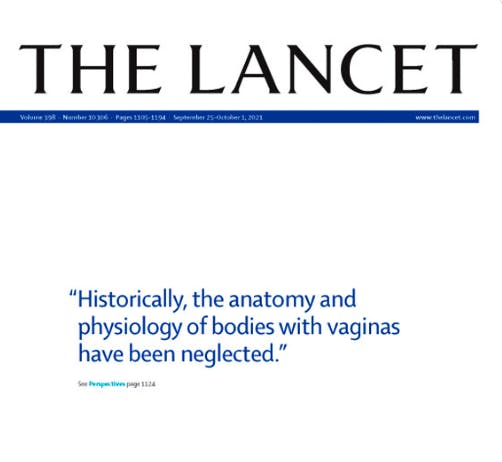 Apart from anything else, “woman” is a word that describes something that other words don’t. Woman is an adult human female. A “body with a vagina” is not necessarily a human, or an adult, it is just a “body” and female. So, addressing the issue of period shame, the Lancet used a phrase that can also describe a dog or a cow or a human female corpse. This is the category our daughters are being offered, a category that includes cattle and dead people.
Apart from anything else, “woman” is a word that describes something that other words don’t. Woman is an adult human female. A “body with a vagina” is not necessarily a human, or an adult, it is just a “body” and female. So, addressing the issue of period shame, the Lancet used a phrase that can also describe a dog or a cow or a human female corpse. This is the category our daughters are being offered, a category that includes cattle and dead people.
The definition of “woman” based in culture (gender), places the essence of a woman in how society, and more particularly, the state defines her. If a woman is not defined by biological criteria, the alternative is imminently less satisfactory.
The brand of feminism that is used to justify, and is in fact owned, by institutionally wielded cultural power, is called “intersectional” feminism, or “liberal” feminism. It is a form of feminism that has been moulded by institutions themselves for its utility. The woman who is prepared to adopt this brand of “feminism”, does so in exchange for the cultural power offered to her. As a result, she hands over the rights and protections that only the wealthiest women can afford to abandon. She abandons the ability to shield her body from males in a public place, the ability to protect her body in a prison, she has discarded any expectation of dignity when changing sanitary products in a women’s refuge, the hope of fair sport, the safety to undress her small children away from a male in a female-only public change room and most tellingly, the right to refuse a sexual partner on the basis of sex.
In short, intersectional feminists have handed over the ability to secure privacy, dignity and safety from males for those women who do not have the resources to secure these things for themselves. They have given away the rights of the most vulnerable of women by declaring that they are kind, and we, the dissident feminists, are nasty and mean.
The British Labour politician David Lammy has labelled nasty feminists like me as “dinosaurs” who are “hoarding rights”. By refusing to redefine women, we old-fashioned feminists selfishly stockpile our rights in our biological definition. This is the perfect example of the person who has been chosen to shame “women” to release the legal vessel that holds her rights, her sex.
At the centre of the political and highly emotive discourse around gender, is the strategic confusion of the individualist concept of “gender identity” with the word we use to describes the meanings and stereotypes cultures attach to sex, “gender”. “Gender identity”, as far as I can tell, is a western term, invented by psychotherapy to describe the feelings and internal sense of a person who has an overwhelming desire to adopt the gender meanings and stereotypes of the opposite sex. Gender identity is something we are now told we all hold, even though many of us deny that we have a special gender self as part of our “identity”.
The word “gender” by itself, however, is a word that describes meanings and stereotypes cultures give to the two sexes. Gender belongs to the culture, not the individual, and not the state. Gender meanings and stereotypes change over time with general consent. Some stereotypes have been prisons for women, and feminists have fought over a long period of time to have the gender we impose on girls to change. Oppressive gender meanings include anchoring women to the domestic sphere, representations of women as sex objects, and beliefs that girls don’t study science.
“Gender Identity” reinvented in a queer theory framework, implies that “gender” is a type of soul that everyone has, like a special gift from Jesus. This “queer” belief is the centre of a new state religion being taught in schools and online. The gender identity soul is constructed by presenting gender stereotypes to children and asking them what set of stereotypes they feel more strongly attracted to. So, the stereotypes that women fought against, are the building blocks for the new “woman” regardless of her body.
The gender identity soul as a legal entity and it’s legal and moral protection in the vulnerable, is the moral justification of a system of cultural control and expanding bureaucracy of gender identity production and protection.
Before this nonsense came along, some forms of cultural intervention into gender had proven to be very successful for the women’s movement. Women advocated to teach girls simple things to combat harmful stereotypes, like that women can be doctors and engineers. But modern gender equity and diversity programs are not an extension of the women’s movement, they are the institutional attempts to appropriate and control the political organisation of women.
By placing women’s reproductive processes, sexual organs, spaces, gatherings, culture, sexuality and political discourses under the increasing draconian umbrella of “equity and diversity”, the tools of political, legal and cultural discipline for women’s political organisation are extensive. As a result, the feminists who do not fall under the taming of “intersectionalism”, face censure and marginalisation.
What Lammy called “hoarding” and “dinosaur” feminists are known as “gender critical’ feminists. These feminists work to have the word “woman” legislatively and culturally protected in our sex rather than our soul. We seek to the right to prepare girls for a world where their body is organised around a specific reproductive function, to teach girls that their body has a high risk of sexual assault and requires protections, that women’s bodies can attract a male partner who will be the most dangerous person in her life, that her biology isn’t a hurdle to success, that her body is powerful and beautiful and can fit a variety of personalities under the banner of “woman”, that some of these personalities are what we call “masculine”, that women can succeed in science, maths and sport. Some of these things we can teach girls are based in sex and some are gender, but it is women, not the state, who should have absolute sovereignty over the female sex and the female gender.
It is clear that mainstream opinion is against the institutional separation of women from process of female bodies. People who told us we were exaggerating about the dangers of placing gender identity in law, are now aghast that women can no longer lay public claim to things like lactation and menstruation. There was outrage in the UK this week at the sight of powerful men debating if the ownership of a cervix is part of being a woman.
With the integration of “gender identity” into our laws and bureaucracies, only the “trans” genders are legally protected. The protections women have had under “sex” are becoming increasingly precarious. In Tasmania, sex is no longer even a protected characteristic and single-sex spaces are illegal to create, as it is unlawful to discriminate against “types of bodies”. This is particularly pertinent language because it is the stark reality of the replacement of the body with the soul as a vessel of protective rights. Women are so rarely raped and murdered by souls and much more frequently by male bodies.
The Lancet calls women “bodies with vaginas” because this is what we are to them. Our soul, our identity, and all the cultural capital that belongs to words “woman” and “girl” have been seized by the state and intergovernmental organisations. “Woman” and “girl” are now legal trademark “gender identities” that are separate from the raw, messy and vulnerable bodily reality that is the life of female people.
By withholding the words “woman” and “girl” to address the cultural issue of “period shame”, The Lancet ridiculously attempted to deal with the feelings, lives and history of those who menstruate by placing them into the categorical company of a dead cow. Not a feminist I know would object to the discussion of menstruation as a special challenge for trans-identified or gender dysphoric women. But taking the category of women from females is not an appropriate solution for trans people. The cost for women and girls is too high, and we refuse to yield it.
The Lancet has issued a non-apology from their male editor in chief. Rather than apologising for redefining women into a category that includes goats, Richard Horton referred to the controversial phrasing as a “compelling call to empower women, together with non-binary, trans, and intersex people who have experienced menstruation.” Women, and lovers of women, I say this in all seriousness, you must resist this language and insist to your local member that we retain our word “woman” with its biological definition. While you are speaking with them tell them you will also resist any gender self ID legislation that defines women on the declaration of a gender “soul”. You will be called a bigot and a transphobe, but the stakes are high.
Without the right to the word “woman”, and its anchor in biological reality, as well as control over powerful gender meanings, we cannot give our daughters the appropriate tools they need to describe themselves, to protect themselves and as corny as it sounds, to learn to love themselves.
Edie Wyatt has a BA Hons from the Institute of Cultural Policy Studies and writes on culture, politics and feminism. She tweets at @MsEdieWyatt and blogs at ediewyatt.com.
Got something to add? Join the discussion and comment below.
Get 10 issues for just $10
Subscribe to The Spectator Australia today for the next 10 magazine issues, plus full online access, for just $10.

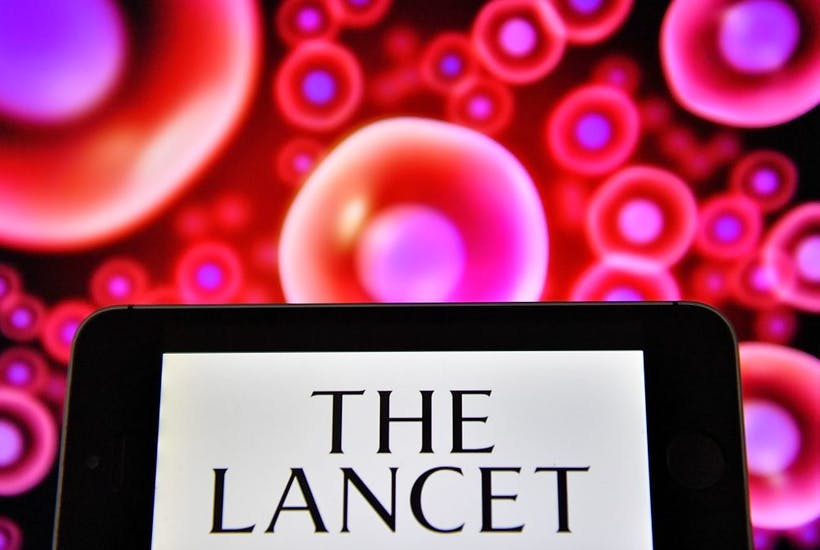
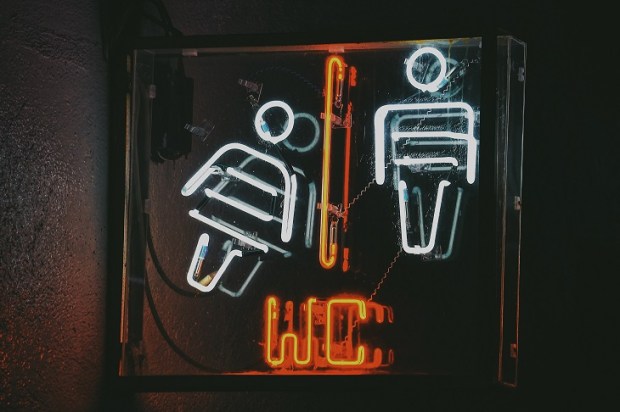
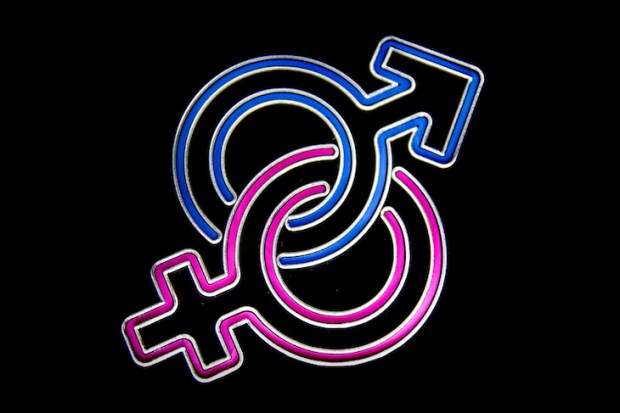
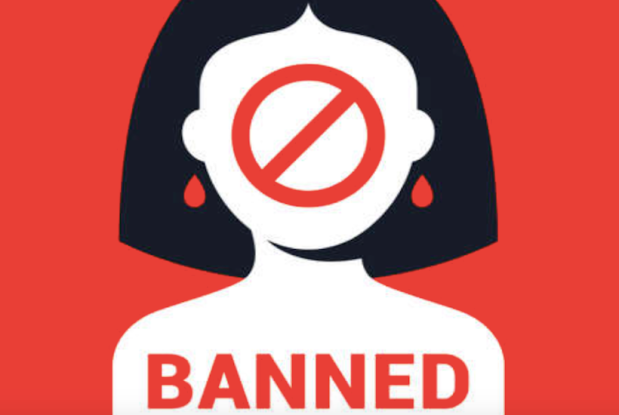
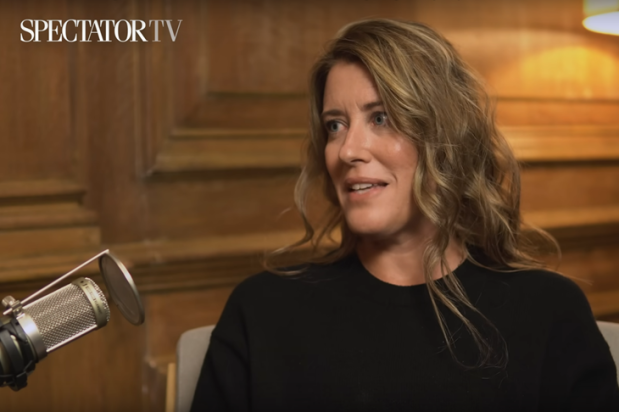




















Comments
Don't miss out
Join the conversation with other Spectator Australia readers. Subscribe to leave a comment.
SUBSCRIBEAlready a subscriber? Log in